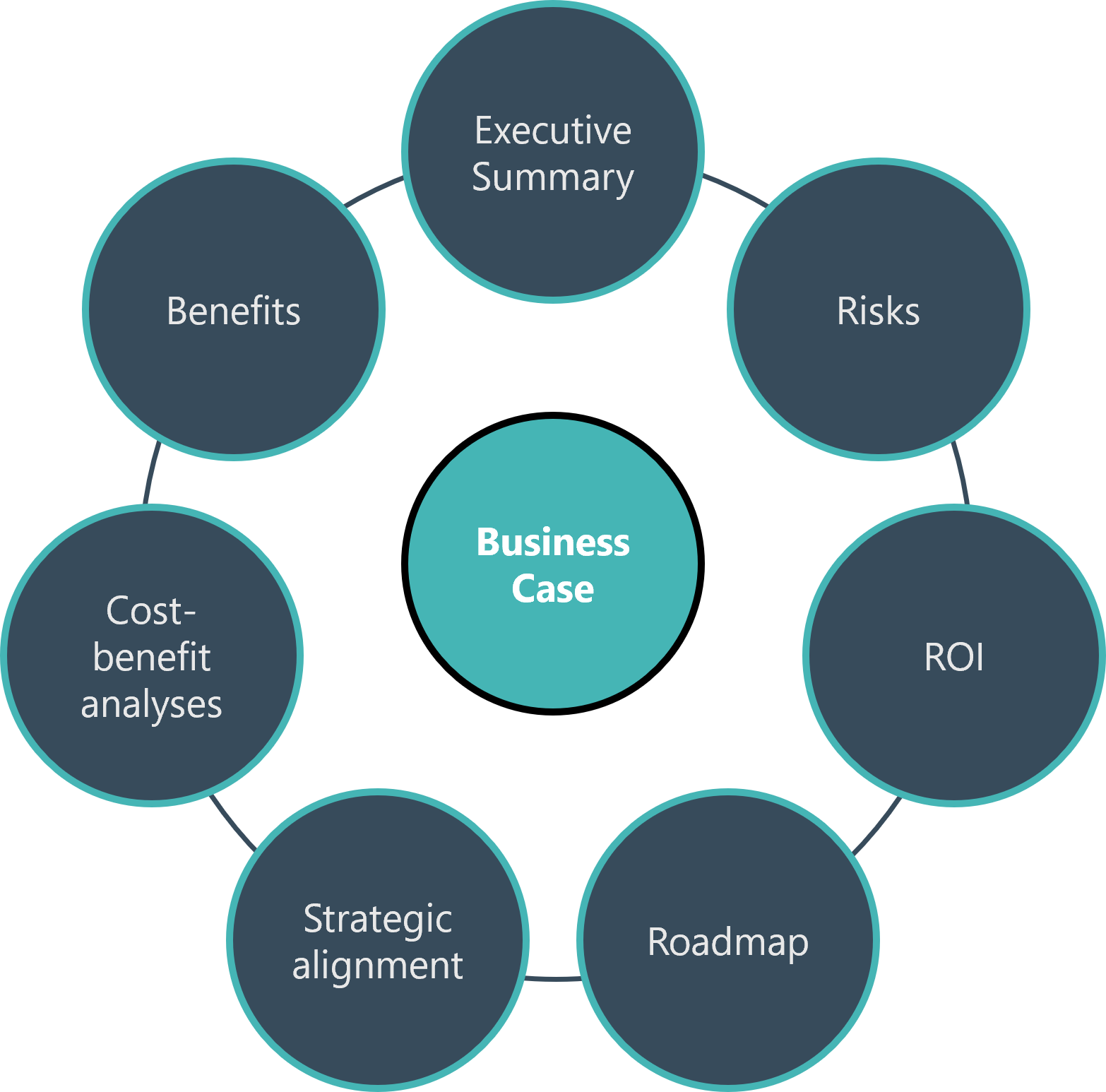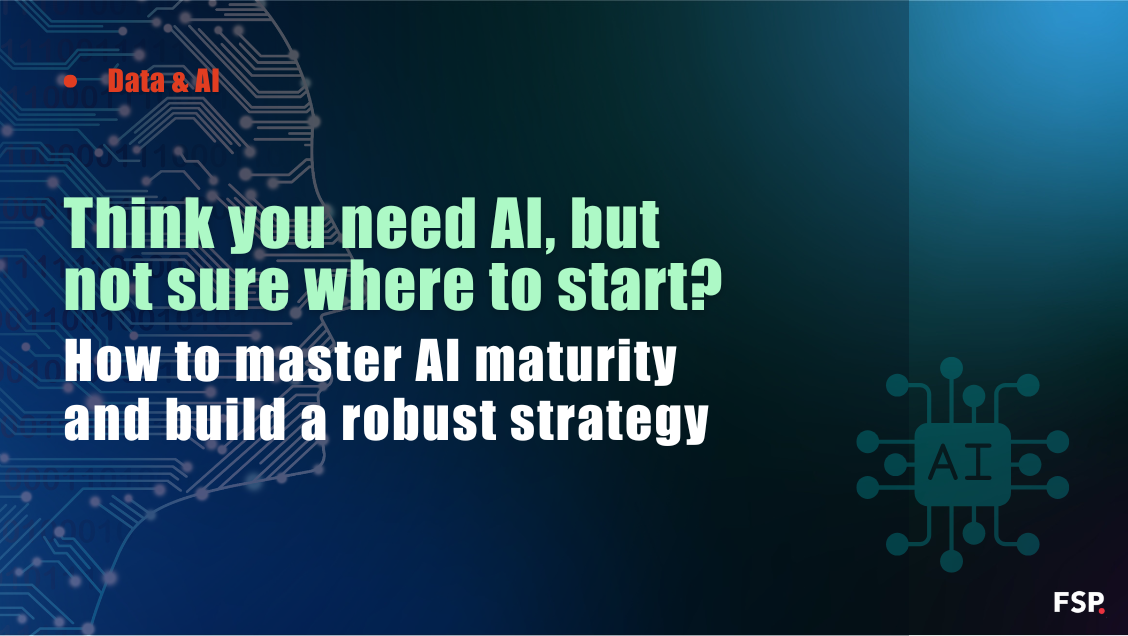In an era where technological advancements drive business success, Artificial Intelligence (AI) stands as a transformative force, promising to revolutionise industries and redefine operational efficiencies.
However, the journey towards harnessing AI’s full potential can be complex and daunting. This is where FSP can help, offering comprehensive support to your organisation in assessing your AI maturity and developing robust strategies to successfully embrace AI.
In this blog, we will explore the pivotal role of AI in modern business landscapes, illustrating how FSP can assist your organisation in understanding your AI readiness and craft an effective AI strategy. We will delve into the multifaceted benefits of building a robust AI strategy and how it aligns with your overarching business goals. Let’s start with defining some key applications where AI can support enterprises.
Key Applications of AI for Enterprises
AI is a branch of computer science that aims to create machines and systems that can perform tasks that normally require human intelligence and abilities. The key applications of AI for enterprises include:
- Process and Task Automation
Streamline processes like data entry and customer service to boost efficiency and satisfaction.
- Content Generation
Create compelling content to increase traffic, conversion rates and brand loyalty.
- Insight Extraction
Analyse complex data to drive decision-making and foster innovation.
- Decision Making
Enhance decision-making in areas like forecasting and risk analysis to boost accuracy and profits.
- Human Representation
Develop interactive human-like tools to enhance communication, learning, and personalisation.
- Human Augmentation
Boost human skills and well-being by enhancing cognitive and creative abilities.
The Benefits of Building an AI Strategy
Developing a well-defined AI strategy provides numerous advantages:
- Strategic Alignment
An AI strategy ensures that AI initiatives align with your organisation’s overarching business objectives, ensuring relevance and impact.
- Innovation and Efficiency
By embedding AI into business processes, your organisation can drive innovation, streamline operations, and achieve unprecedented efficiencies.
- Competitive Advantage
Organisations with a strong AI strategy can leverage advanced analytics and predictive capabilities to stay ahead of the competition.
- Risk Management
A strategic approach to AI helps mitigate risks associated with biased algorithms, data privacy, and security.
- Engagement and Inclusion
A well-defined AI strategy can help bring everyone in the organisation on your AI journey, promoting inclusiveness through transparent communication and ensuring that all voices are heard and considered.
Steps FSP Takes to Build an AI Strategy
FSP’s approach to AI strategy development is both comprehensive and tailored, ensuring that your organisation’s unique needs are addressed. Here are the key steps involved:
1. Baselining Your AI and Organisational Strategy

The journey begins with an in-depth assessment of your business objectives, determine AI’s role in meeting them and pinpointing the Key Performance Indicators (KPIs). We will also establish your foundational principles for AI upfront. This includes aligning AI initiatives with business objectives and defining your Responsible AI Principles. These foundations will be expanded and iterated as we progress through the programme and ultimately used to guide the strategic proposal for future scaling of AI delivery.
2. Assessing AI Maturity

We perform an in-depth assessment of your organisation’s current AI capabilities. This involves evaluating existing resources, technological infrastructure, and the level of AI integration within business processes. By understanding the starting point, FSP can tailor the strategy to bridge gaps and build on strengths.
3. Identifying and Prioritising AI Use Cases

Engaging with stakeholders across departments, FSP identifies potential AI use cases that align with strategic goals. These use cases are then systematically evaluated based on value, impact, and feasibility. The prioritisation process ensures that resources are allocated to initiatives with the highest potential.
4. Delivery of Proof of Concept Projects

To validate AI use cases, FSP delivers priority Proof of Concept (PoC) AI projects. This involves defining project scope, designing AI solutions, and conducting validation experiments. The focus is on quickly developing robust solutions and assessing their scalability for broader application.
5. Business Case Development

FSP synthesises insights from the PoC projects into compelling business cases. These documents include cost-benefit analyses, risk assessments, and Return on Investment (ROI) projections. They serve as strategic guides for full-scale AI integration.
6. Proposal for Future Scaling of AI

Finally, FSP develops a strategic proposal for the future scaling of AI within your organisation. This includes articulating the vision, upskilling employees, establishing governance structures, and creating a change management plan. The goal is to lay a strong foundation for sustainable AI-driven success.
Key Concerns Addressed by an AI Strategy
Developing a cohesive AI strategy addresses several critical concerns:
- Ethical AI Usage:
Establishing Responsible AI Principles ensures that AI applications are fair, transparent, and unbiased.
- Data Privacy and Security:
By defining governance structures and protocols, your organisation can safeguard sensitive data and comply with regulatory standards.
- Resource Allocation:
Prioritising AI use cases based on value and feasibility helps optimise resource allocation and maximise ROI.
- Change Management:
A well-defined change management plan ensures smooth adoption of AI technologies, minimising resistance and fostering acceptance.
Conclusion
FSP’s strategic approach to AI implementation empowers organisations to navigate the complexities of AI adoption and unlock new opportunities for growth and innovation. By assessing AI maturity and developing a robust AI strategy, FSP helps your organisation achieve its business objectives, drive operational efficiencies, and maintain a competitive edge in an increasingly AI-driven world.
Get in touch to discuss how we can help you.

